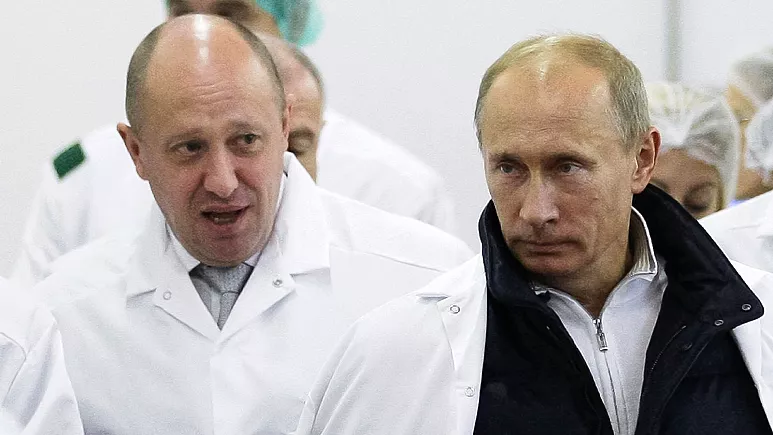The reported death in an air crash of the controversial Wagner Group chief Yevgeny Prigozhin, who had rebelled against Russia’s President Vladimir Putin two months ago, has cast doubts about whether it was just an accident or a brutal, cynical act of political vendetta. By hindsight it tends to confirm the forecast of CIA Director William Burns, who had quoted from Mario Puzo’s Godfather book immediately after the mutiny, that “Putin is someone who generally thinks that revenge is a dish best served cold.”
On August 23, exactly two months after his short-lived revolt, a private jet crashed outside Moscow, Russia with Prigozhin stated to be on board. As is natural, Russia is rebutting the charge and scotching speculation in this regard. The unrest and open rebellion by Prigozhin, who had come with his army dangerously close to Moscow, was seen by observers as having been the biggest threat to Putin’s long rule. Kremlin spokesman Dmitry Peskov dismissed the suspicion of a plot leading to the death of Prigozhin as “an absolute lie.”
What strengthens the suspicion, however, is the silence of Putin who took 24 hours after the crash to offer his “sincere condolences to the families of all the victims.” He did not even explicitly mention Prigozhin’s name as one of the casualties and only referred to him in a mysterious, oblique way. He described Prigozhin as a person who had “made serious mistakes in his life, but he achieved the right results.” The Wagner Group and its charismatic chief, who was beholden to Putin, had played a crucial role on behalf of Putin’s Russia in launching attacks in Ukraine and providing mercenaries for armed conflicts in dozens of countries in Africa and Arab. In the fitness of things the Russian President should attend his funeral. But, Peskov ruled it out saying the president’s work schedule is quite busy at the moment.
The question is why Putin is distancing himself from the mysterious air crash and the death of one of his ardent followers who had seemingly turned hostile only about two months ago after doing his bidding for ever. The Russian President had apparently been jolted by the mutiny that lowered him in the eyes of his people who had thought he could be challenged by none. He looked very vulnerable and not invincible when he struck a deal with Prigozhin and let him fly to Belarus and condone his defiance. The subsequent tragic end of the Wagner chief appears to be a loud and clear message that challenging Putin’s authority means death.
For many Russian observers Prigozhin’s death hardly came as a surprise. Putin has a long history of taking out those he perceives as traitors. Throughout his political career, he has made clear that he values loyalty above all else. In the 1990s, when he was deputy mayor of Saint Petersburg and his then-boss Mayor Anatoly Sobchak lost a re-election bid, he supposedly turned down an offer to work for Sobchak’s rival by stating : “It’s better to be hanged for loyalty than be rewarded for betrayal.” Much later in an interview he said what he cannot forgive is treason. He branded Prigozhin as a traitor after he rose in mutiny.
Since Putin captured power in 2000, many who crossed his path have mysteriously died. The list of such men is long enough starting from General Alexander Lebed, a widely popular governor who was seen as a possible challenger to Putin, to oligarch Boris Berezovsky who funded Opposition efforts after going into exile in London. Lebed died in a 2002 helicopter crash and Berezovsky died in London in 2013 under suspicious circumstances. Reaching further out, Putin’s known detractors Pavel Antov and Vladimir Bidenov were, equally mysteriously, supposedly died by suicide at Rayagada in southern Orissa.
Prigozhin’s mutiny also triggered a wave of dismissals of military officials. General Sergei Surovikin, on whom Prigozhin had publicly heaped praise in contrast to other Russian commanders and defence officials, disappeared after the mutiny. But, on the day Prigozhin’s air crash occurred, reports surfaced of Surovikin’s official dismissal as head of the air force. There are other Russian generals and critics of the Ukraine invasion who have apparently incurred the wrath of the Kremlin.
Surprisingly, Russian state media and institutions which have often shied away from reporting on suspicious deaths and assassinations, have gone overboard in reporting the plane crash that killed Prigozhin. The Russian aviation authority also quickly published the list of passengers on the jet, while onlookers were allowed close to the crash site. This is rather unusual in Putin’s Russia.
The inescapable conclusion is Putin is trying to send out the message to all those influential countrymen of his who criticise his Ukraine adventure that they would meet the same fate as Prigozhin’s, if they open their mouth against him.
